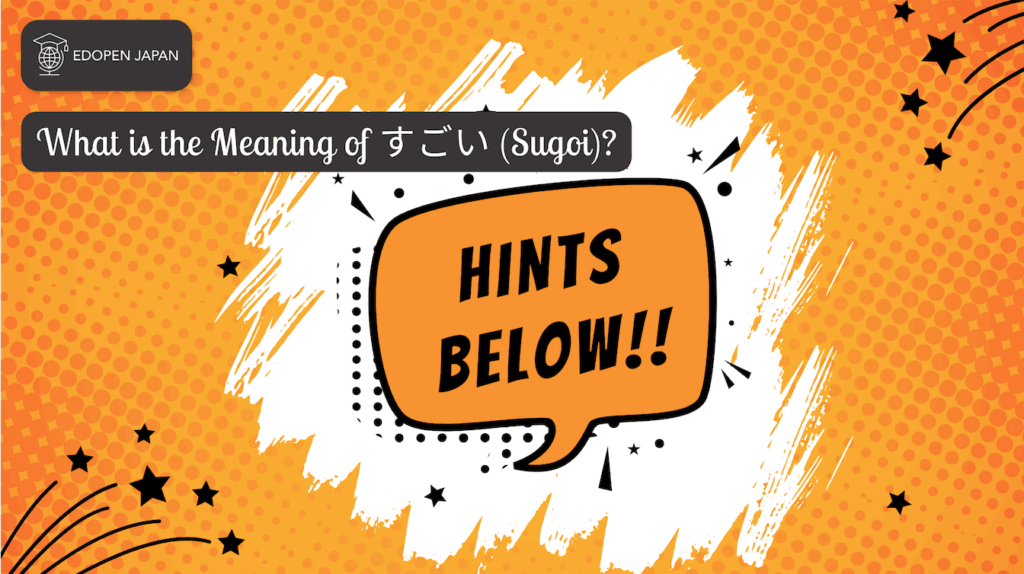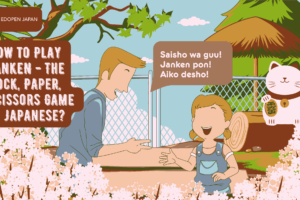You may have heard this word, すごい (sugoi) on many occasions. For example, maybe in anime, Japanese TV reality shows, or when you read Japanese news. It’s true! In everyday life, the word すごい (sugoi) is actually spoken a lot. If you’ve studied Japanese a lot, you may even have heard or read many examples of its use when you first started learning Japanese.
The term すごい (sugoi) is often used in both positive and negative situations. This may confuse you. You may hear the speaker say it to express pleasure or extreme amazement, but on the other hand, this expression can also be used in situations where the speaker feels that he or she is facing something bad or terrible.
Don’t worry and get confused. In this article, we will discuss the term すごい (sugoi) as thoroughly as possible. Of course, with examples that will make you really understand how the situation of using the term すごい (sugoi) really is.
Also, please be sure to check out our recommendations for other Japanese phrases that are also very common and come up a lot in everyday conversation!
Read also:
The Meaning of Yabai (やばい): All You Need to Know
Everything You Need to Know about “Daijoubu (だいじょうぶ)”
All Important Things You Need to Know about Jouzu (じょうず)
Contents
Getting to Know すごい “Sugoi”

Most of the time, “sugoi” can be written in both hiragana すごい or kanji 凄い. Sometimes, in social media posts, magazine articles, or messages between friends, you may also see the word written in katakana スゴイ to emphasize that word.
➲ Hiragana: すごい
➲ Katakana: スゴイ
➲ Kanji: 凄い
Here is the basic conjugation of the adjective “sugoi”:
| Affirmative Basic | Affirmative Polite | Negative Basic | -te て form | |
|---|---|---|---|---|
| Present Tense | すごい sugoi | すごいです sugoi desu | すごくない sugoku nai | すごくて… sugoku te |
| Past Tense | すごかった。 sugo katta | すごかったです sugo katta desu | すごくなかった sugoku nakatta | – |
What is the Meaning of すごい (Sugoi)?

First, let’s see what the dictionary says about “sugoi”. According to the Goo Dictionary, the definition is as follows:
❍ Expressing the feeling of surprise
❍ Showing the degree to which the status of someone / something is extraordinary
❍ Dreadful; horrible; weird; ghastly
In general, people use “sugoi” on much more casual occasions. With “sugoi” you can express your feeling of surprise, or amazement at something or someone in either a positive or negative way.
In addition, “sugoi” can be placed before a verb, i-adjective, or na-adjective to indicate the degree of action or status at a high level.
As mentioned in the previous section, すごい can also be written as 凄い in Kanji. The Kanji character 凄 literally means “terrific”. Like in English, terrific can be negative and positive at the same time.
The Meaning of すごい (Sugoi) in English
- Amazing
- Wow
- Awesome
- Great
- Remarkable
- Impressive
- Terrific
How to Use すごい (Sugoi)?

Here we try to divide the expression すごい “sugoi” into 3 groups. Let’s have a look below!
① すごい / すごいです(ね)
People use “sugoi” to express the feeling of being surprised or amazed by someone or something, which is similar to “wow” in English. It is also often used as a compliment to others.
すげえ / すげぇ “sugē”
Have you heard of it? This is another form of “sugoi”, which is the language of young people, 若者言葉 “waka-mono-koto-ba”. In general, it is inappropriate to use them when talking or texting with your boss, professor, or people you are not close to. However, it is not a problem to use it with your close friends.
すごーい
You can also hear other people say “sugoi” this way, with a long “o” in the middle. Sometimes you can find this in the manga as well.
② Used as an adjective
すごい + Noun
“Sugoi” can act as an adjective “形容詞 (kei-yō-shi)” attached to a noun “名詞(mei-shi)” without conjugation. For example, すごい雨 (heavy rain), すごい話 (amazing talk/story), or すごい食欲 (enormous appetite).
③ Used as an adverb
すごい + く + Verb / i-Adjective / na-Adjective
When “sugoi” is used as the adverb “副詞 (fuku-shi)”, you must remove the い”i” in the ending. And then put く”ku” in front of the verb / i-adjective / na-adjective. For example, すごく歩いた (walked a long way), すごく美味しい (extremely delicious), or すごく綺麗 (extremely beautiful).
💡 Notice
In everyday conversation, you can also hear native Japanese speakers often say “すごい歩いた”, “すごい綺麗”, “すごい美味しい”. People use “sugoi” instead of “sugoku”. Of course, this is a grammatical error. However, some native speakers say that “sugoi” is sometimes more natural. One of the reasons is that when ご”go” is combined with く”ku”, it makes pronunciation more difficult.
Learn Sugoi with Conversations

❶ すごい!
| 健と潤はルームメート。 健:JLPTの結果が届いた!もう早く見たいよ! 潤:ほんと?!よし、見よ! 健:あー緊張する。 潤:すごい!満点ね!おめてとう! 健:ありがとう。早く先生に言いたい! |
| (Ken and Jun are roommates.) Ken: I just received my JLPT score report. I can’t wait to open it! Jun: Really! Let’s open it now! Ken: I am really nervous right now. Jun: Wow! You got full marks on N1. Congratulations! Ken: Thank you. I’m going to tell the good news to my instructor. |
❷ すごく+i-Adjective / Verb
| (健と潤は昼ごはんを食べています。) 健:この後授業ある? 潤:ないよ。 健:じゃあ、サッカーしよう!すごくいい所知ってるよ。 潤:いいね!行こう! 健:最悪!雨がすごく降っている。雷もすごい。 潤:なに!ついさっきまでは晴れていたのに! |
| (Ken and Jun are having lunch together.) Ken: Do you have class later? Jun: No, there is no class in the afternoon. Ken: Let’s play soccer! I know a great place. Jun: Great! Let’s go! Ken: Oh, no. It’s raining heavily outside. The thunder is also terrible. Jun: What! It was sunny 10 minutes ago. |
❸ すごく+i-Adjective / -te from
| 健:潤、おはよう!すごく顔色悪い! 潤:昨日寝れなくて、、、 健:何があった? 潤:上の階の人が一晩中パーティーしてたみたいで、すごくうるさかったんだよ。 健:それは最悪だったね。 潤:それだけじゃなくて、ルームメイトのいびきもすごくて、本当最悪だったよ。 |
| Ken: Jun, good morning. You look so bad. Jun: I didn’t sleep at all last night. Ken: What happened? Jun: The people upstairs were having a party all night, it was really noisy. Ken: That’s bad. Jun: What’s even worse is that my roommate’s snoring was crazy as well. |
❹ すごく+ Noun / i-Adjective, Past tense
| 健:昨日ついにユキとリアルで会えた。 潤:おお〜それで昨日どうだった? 健:ユキはすごい美人で、もうすごく楽しいデートだった、でも、、、 潤:でも何? 健:ユキは大食いで、すごい量をすごい速さで完食してて。 潤:それはすごい、、、 健:だからお会計もすごかったよ、、、 |
| Ken: Yesterday, I finally meet with my online friend, Yuki. Jun: Oh, how was your date? Ken: Yuki is a stunningly beautiful lady. I had a great date with her. But… Jun: But what? Ken: She is a big eater. She finished a great amount of food in just a few minutes. Jun: Wow, that’s amazing… Ken: And, that meal cost me a lot… |
Summary
Hopefully, this article will give you a better understanding of the use of すごい (sugoi).
- Used to convey the feeling of being amazed or surprised by someone or something.
- Acts as an adjective to describe anything that is amazing, surprising, or awesome in either a positive or negative way.
- Acts as an adverb to indicate the degree of action or status at a high level.














Leave a Reply